This page summaries the story of Rosa and Jakob (also spelled “Jacob”) Edelmuth as we know it as of June 2025. A page created earlier tells the story of how we learned about Rosa and Jakob starting in 2009, but it is much more about the process of research. See “Discovering the Story of Rosa and Jakob Edelmuth“.
*****
Rosa Wertheimer, b. 1887, was the middle child of Nathan and Malwine (née Frankenberg) Wertheimer. Both her parents were born the same year, 1859, and in the same village: Marisfeld. She had two siblings: older brother Julius, b. 1886, and younger sister Bella, b. 1890. The three children were all born in the town of Themar in Thüringen (or Sachsen-Meiningen as it was then).
Jakob Edelmuth was born in the town of Beuern in Hesse on 14 January 1884. How and when he and Rosa met is not known. They married on 20 August 1912 in Halle/Saale. Their daughter, Lieselotte, was born in 1913 in Halle a/d Saale. A son, Siegbert, was born in 1917. A wartime record in the Arolsen Archives tells us that Jakob Edelmuth served in the German army during World War I.
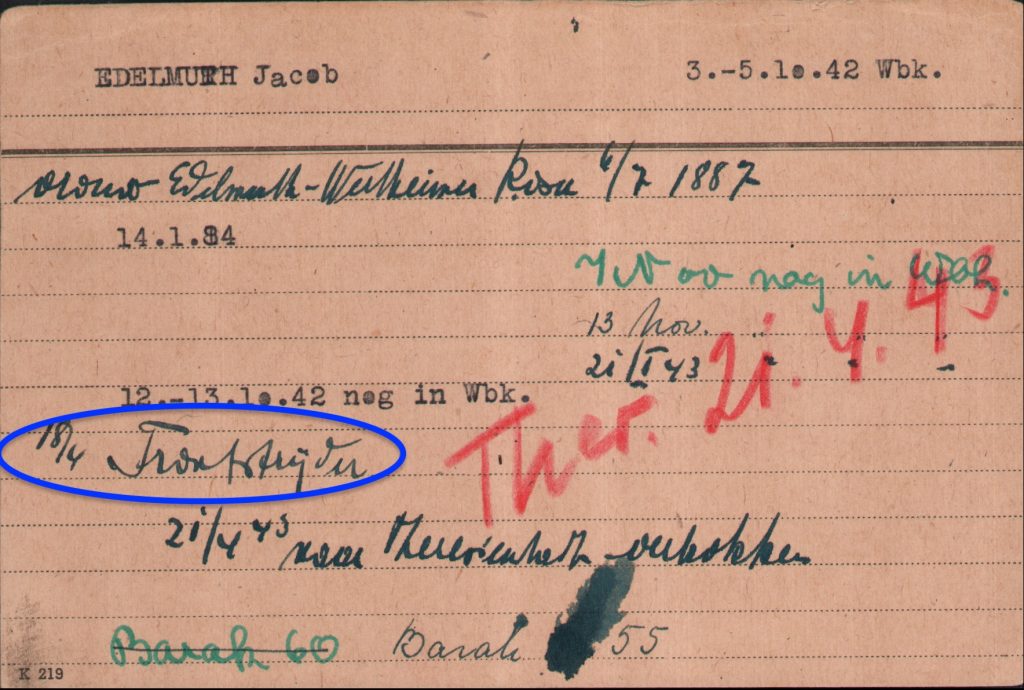
*****
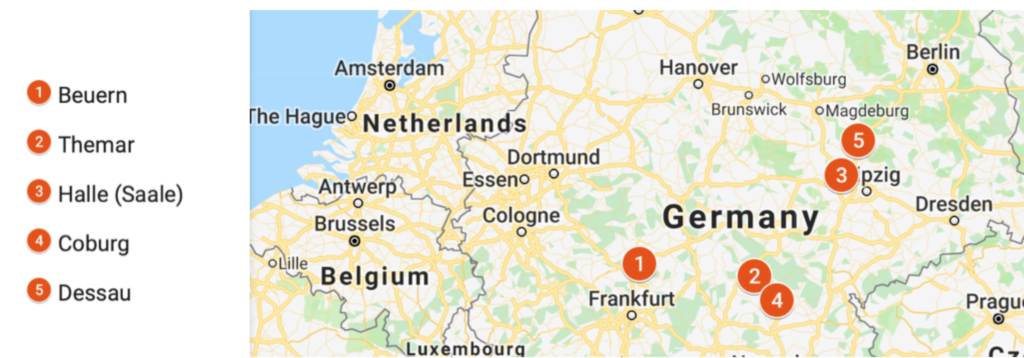 As the map above indicates, movement within Germany was a key pattern of the the Edelmuths’ lives; desire and need for economic opportunity, and family ties, were probably the motivating factors. Initially Rosa and Jakob may have lived in Halle because Jakob worked for Nathan Frankenberg, Rosa’s uncle (brother of Malwine Wertheimer, née Frankenberg). Nathan and his wife, Minna (née Gassenheimer), ran the Halle branch of the Gassenheimer agricultural works.
As the map above indicates, movement within Germany was a key pattern of the the Edelmuths’ lives; desire and need for economic opportunity, and family ties, were probably the motivating factors. Initially Rosa and Jakob may have lived in Halle because Jakob worked for Nathan Frankenberg, Rosa’s uncle (brother of Malwine Wertheimer, née Frankenberg). Nathan and his wife, Minna (née Gassenheimer), ran the Halle branch of the Gassenheimer agricultural works.
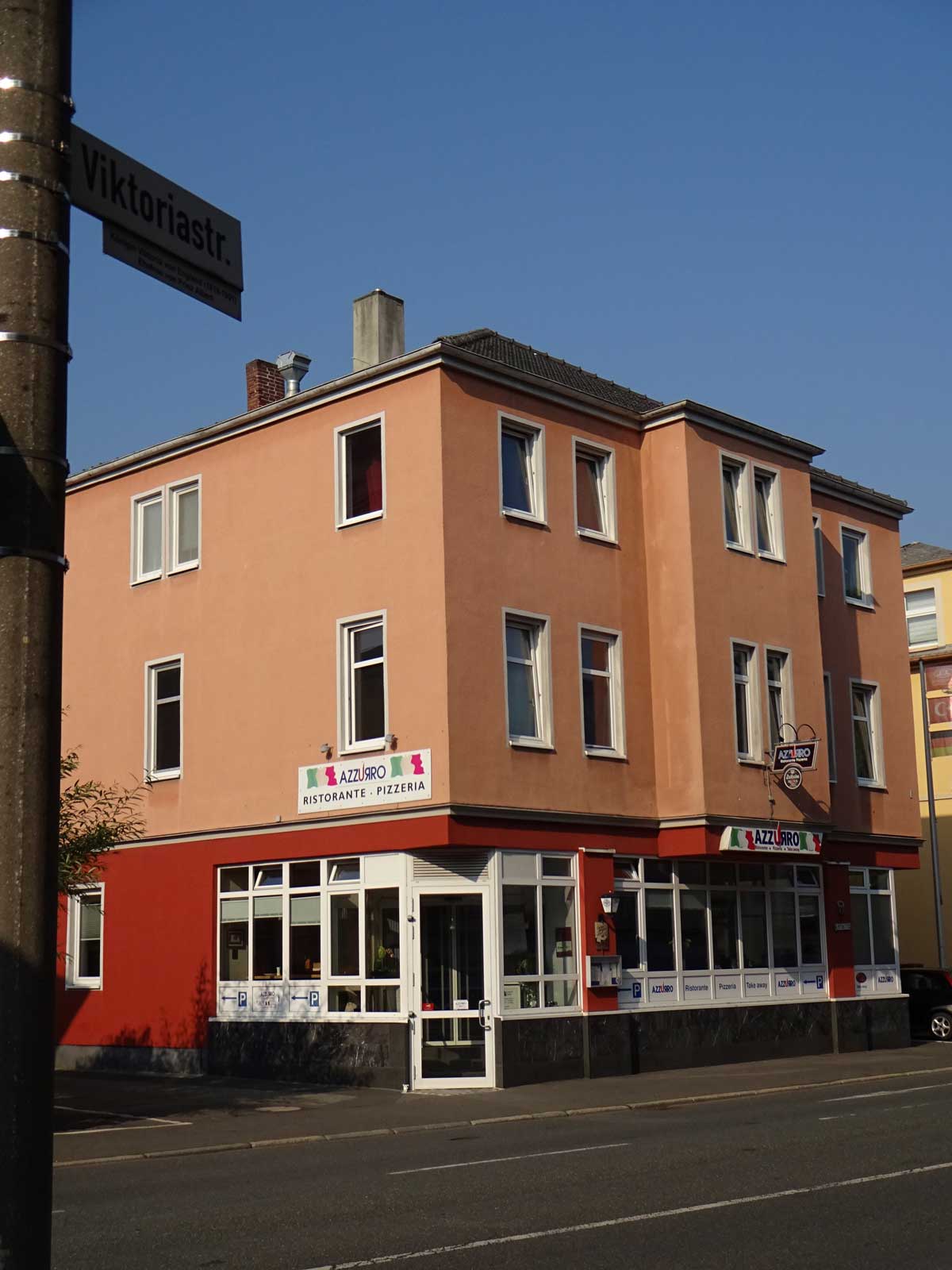
What happened to prompt a move from Halle to Coburg is not known. Perhaps it was the growing family cluster of Wertheimers in Coburg that pulled them rather than something in Halle pushing them. Regardless, in spring 1919 the four Edelmuths moved to Coburg. They lived at Viktoriastraße 1, a building owned by Rosa’s father. In 1921, Rosa’s sister, Bella, with her husband, Milton, also lived in this house. In his entries in the address books of Coburg, Jakob identified himself as a “Kaufmann” or business man.
*****
The next major migration by Edelmuth family members occurred in the first year of the Nazi Regime. But we cannot conclude that it was caused directly by actions of the new government. In early July 1933, 20-year-old Lieselotte left Germany and went to the Netherlands. On 1 November 1933, she married Erwin Georg Sigfried Karl Meder, a non-Jew, who had moved from Germany to the Netherlands in 1926. Rosa, Jacob, and Siegbert also moved in the fall of 1933 but remained within Germany. They chose to go to Dessau in Saxony.
Siegbert Edelmuth left Dessau and Germany in 1934; details of his birth, etc. are entered in the Netherlands Population Register in April 1934. In February 1936 he left the Netherlands, and Europe, and immigrated into South Africa.
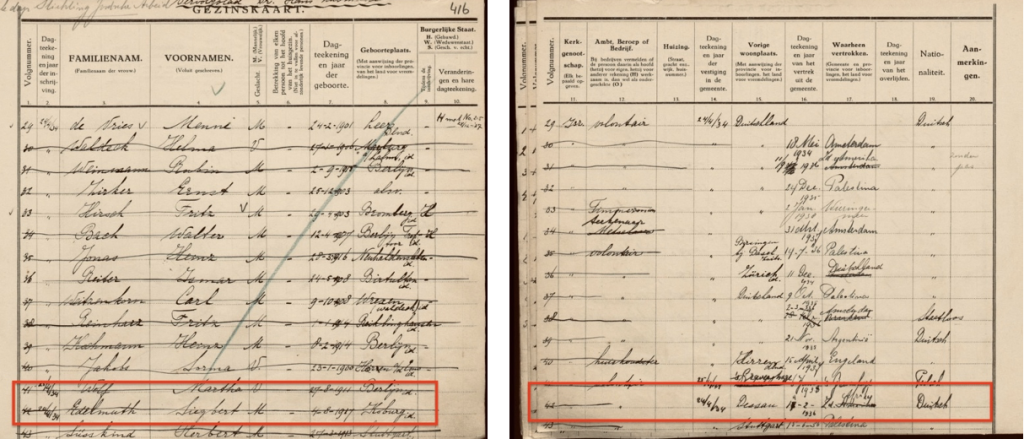
*****
From 1933-early 1939, Rosa and Jakob lived at Franzstrasse 3-4/II. Jakob continued to identify himself as a Kaufmann in the Dessau Address Book.

In mid-October 1934, Nathan Wertheimer, Rosa’s father, left Coburg and came to Dessau to live at Franzstrasse.
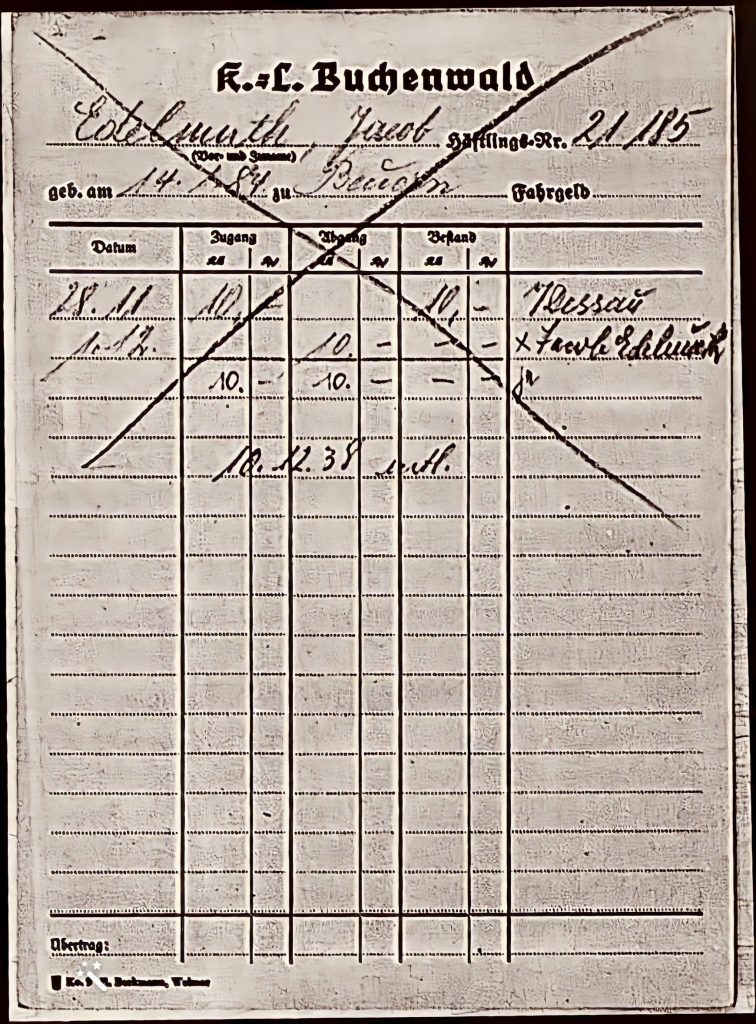
On 9/10 November 1938, Jakob was taken into so-called ‘protective custody’ (Schutzhaft) and taken to Buchenwald KZ. He was not released until 10 December 1938.
We do not know if Rosa and Jakob had started to explore the possibility of emigration before November 1938, but with Jakob’s arrest and imprisonment, they made concrete plans. Their decision was to join their daughter Lieselotte in the Netherlands: on 13 January 1939, Jacob Edelmuth arrived in the Netherlands; a month later, Rosa and her father joined him. They lived at Slaakstraat 11 III in Rotterdam. Milton Wertheimer, husband of Rosa’s sister Bella, was also in the Netherlands but in Amsterdam where he had been since his arrival in 1936..
Unfortunately, emigration to the Netherlands did not provide safety. The invasion of the Netherlands in May 1940 more or less trapped the Edelmuths even though the first years of Nazi occupation were somewhat bearable. But on 15 July 1942, the deportations from the transit camp of Westerbork began. On 3 August 1942, 83-year-old Nathan Wertheimer, Rosa’s father, died. On 3 October 1942, Rosa and Jacob Edelmuth were rounded up in Rotterdam and taken to the transit camp of Westerbork where they remained imprisoned for more than six months.
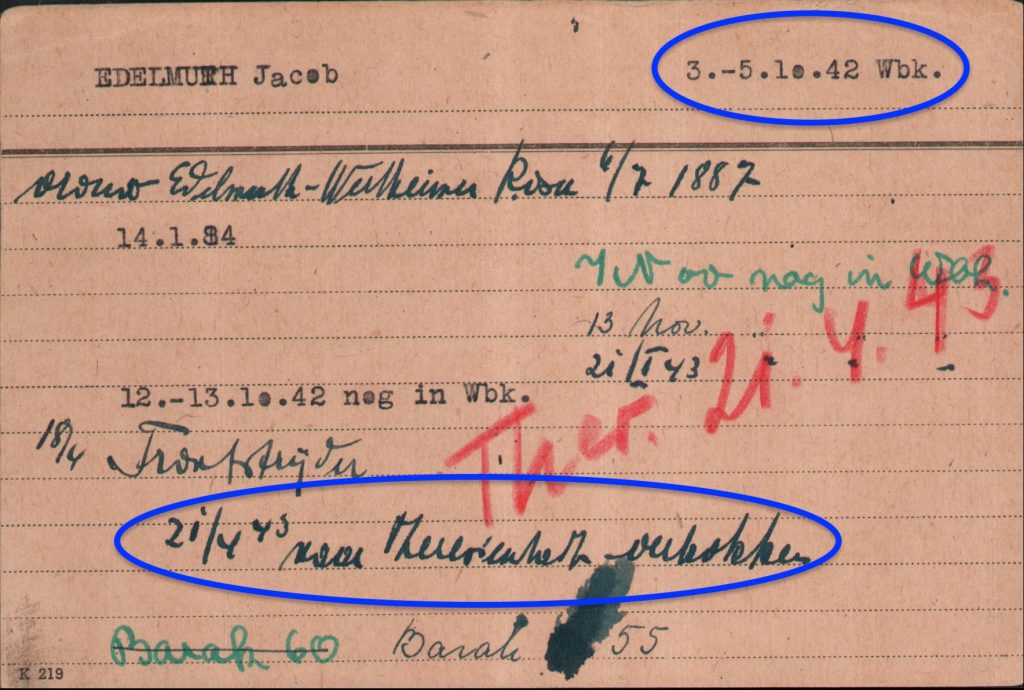
On 21 April 1943, Rosa and Jacob Edelmuth were on the first transport from Amsterdam to Theresienstadt Ghetto. According to the deportation chronology on the Gedenkbuch site, this transport of 295 people “consisted exclusively of German Jews, of whom 195 were taken from Westerbork.” Among them were World War I soldiers who had been decorated or wounded who were told that the ghetto in Theresienstadt was a retirement home for privileged Jews. Whether Jakob Edelmuth was one of these soldiers we do not yet know although the notation “Frontline soldier” on the index card may indicate that he was. Milton Wertheimer, husband of Rosa’s sister Bella, was on the same transport. Whether he and Rosa knew that Bella had been deported from Thüringen on 10 May 1942 to Belzyce Ghetto, is unknown.
Rosa and Jakob were in the Theresienstadt Ghetto six months before being transported further to Auschwitz-Birkenau. Both were murdered on 9 March 1943.
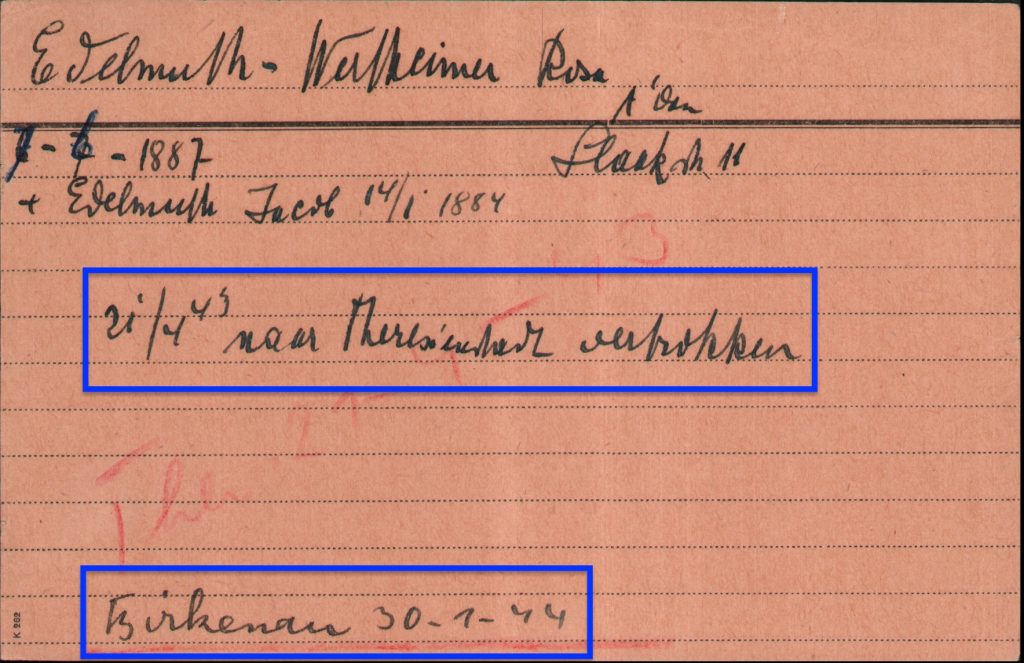
*****
Their children survived the war and Holocaust. Lieselotte had the protection of being married to a non-Jew. After the war, she and her husband emigrated from Holland to South Africa where Siegbert lived. Siegbert Edelmuth died on 03 September 1981 and was buried in the West Park Cemetery, Johannesburg, South Africa.1Weltweites jüdisches Bestattungsregister von JewishGenErwin Meder died in South Africa about 1983. After their deaths, Lieselotte returned to Germany and died there about three years later.
On 20 March 2015, Stolpersteine were laid for Rosa Edelmuth, née Wertheimer, and Jakob Edelmuth in front of the house they lived in in Dessau. 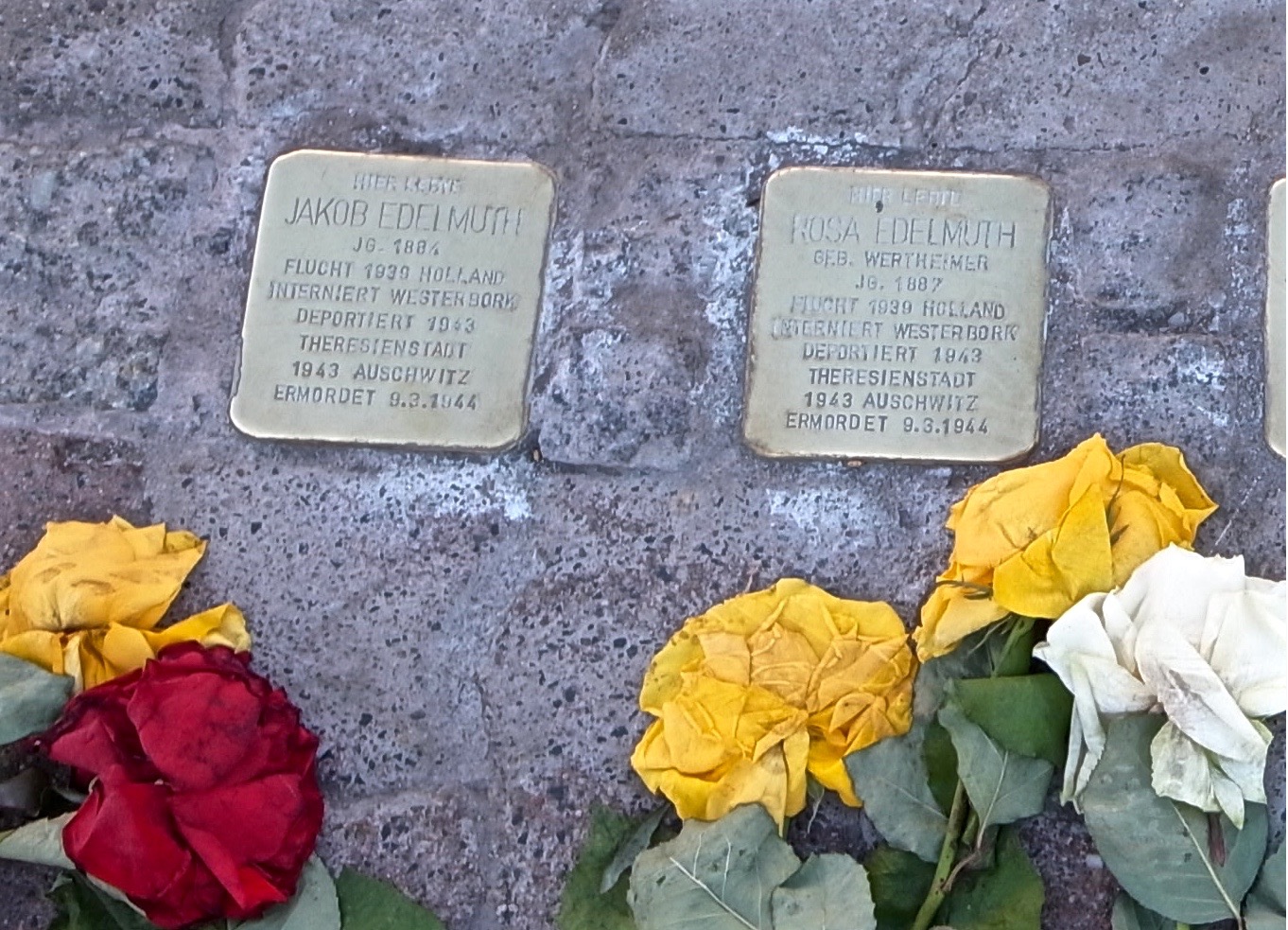
We wish to acknowledge the contributions of Lisa van Beek, Bernd Ulbrich, and Gabriela Schuller, which made the telling of this story possible. Thank you!
If you wish to comment, please contact s.meen79@g.mail.com